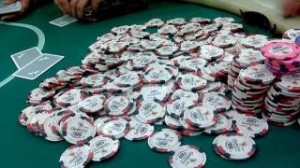The slow play is a type of deception that is oftentimes very effective for creating a big pot. In order to maximize the slow play you should have a very strong hand. You will want to do this in the early rounds of betting as well, because the slow play works best when there is the allure of a potentially big pot. The idea here is to lure people into a hand where they will continuously put money into the pot, only to be surprised by the strength of your hand at the end and ultimately pay you when their hands end up being losers.
The slow play works like this: you do not bet the true value of your hand. Instead, you let others do the betting for you. Passively, you wait until the pot is large, calling other people’s bets. Only when you know that they will pay you do you start to raise yourself. This is mostly done on the final round of betting where you will win the pot right away if they do end up folding. The idea with the slow play is to get your opponents to put in as much money as possible because they think that they have the best hand. But, if you slow play only your strong hands, they will hardly ever have the best hand, causing you to win large pots.
Like all poker strategies, you do not want to overplay this one. Too much slow playing on your part will cause opponents to freeze up and just check through all of their hands. This, obviously, does not get any money in the pot for you to win.
Another factor to consider is when you have the absolute nuts. In this case, you will not want to slow play because there is a possibility that your opponent may have a strong hand as well. When you have the nuts, you will want to bet that hand for value because there are no ways you can lose, and thus you want your opponent to call as much as possible. This is a rare but important exception to the slow play routine.
 The bluff is perhaps the most famous element of poker. Only in a game like poker can you have absolutely no chance of winning, yet still pull out a victory just because you acted confident. Still, there are some rules that need to be abide by when it comes to bluffing. For one, you cannot bluff on a regular basis; if you do your opponents will recognize that you are bluffing and will be able to beat you with extremely weak hands. Obviously, the bluff, if overused, loses its entire efficacy.
The bluff is perhaps the most famous element of poker. Only in a game like poker can you have absolutely no chance of winning, yet still pull out a victory just because you acted confident. Still, there are some rules that need to be abide by when it comes to bluffing. For one, you cannot bluff on a regular basis; if you do your opponents will recognize that you are bluffing and will be able to beat you with extremely weak hands. Obviously, the bluff, if overused, loses its entire efficacy. The size of the pot up for grabs should play a definite role in your poker playing. There are several reasons for this, one of which has to do with the fact that it is better to win one extremely large hand rather than a bunch of small ones. Think about it this way, would you rather win $100 one time or $10 nine times? Sure with the latter you would be winning more hands and probably be a bit less frustrated, but the $100 is a larger amount. We
The size of the pot up for grabs should play a definite role in your poker playing. There are several reasons for this, one of which has to do with the fact that it is better to win one extremely large hand rather than a bunch of small ones. Think about it this way, would you rather win $100 one time or $10 nine times? Sure with the latter you would be winning more hands and probably be a bit less frustrated, but the $100 is a larger amount. We 


